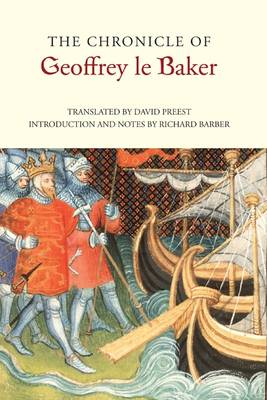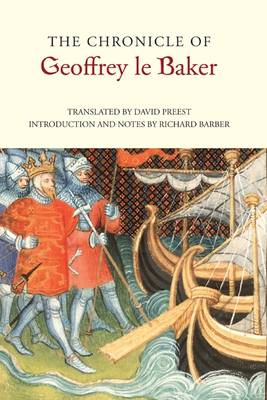
- Retrait en 2 heures
- Assortiment impressionnant
- Paiement sécurisé
- Toujours un magasin près de chez vous
- Retrait gratuit dans votre magasin Club
- 7.000.0000 titres dans notre catalogue
- Payer en toute sécurité
- Toujours un magasin près de chez vous
The Chronicle of Geoffrey Le Baker of Swinbrook
Livre relié | Anglais
153,45 €
+ 306 points
Description
Geoffrey le Baker's chronicle covers the reigns of Edward II and Edward III up to the English victory at Poitiers. It starts in a low key, copying an earlier chronicle, but by the end of Edward II's reign he offers a much more vivid account. His description of Edward II's last days is partly based on the eyewitness account of his patron, Sir Thomas de la More, who was present at one critical interview. Baker's story of Edward's death, like many other details from his chronicle, was picked up by Tudor historians, particularly by Holinshed, who was the source for Shakespeare's history plays. The reign of Edward III is dominated, not by Edward III himself, but by Baker's real hero, Edward prince of Wales. His bravery aged 16 at Crecy is presented as a prelude to his victory at Poitiers, a battle which Baker is able to describe in great detail, apparently from what he was told by the prince's commanders. It is a rarity among medieval battles, because - in sharp contrast to the total anarchy at Crecy - the prince and his staff were able to see the enemy's manoeuvres. Throughout the chronicle there are sharply defined vignettes which stay in the mind - the killing of the Scottish champion on Halidon Hill, the drowning of Sir Edward Bohun, the earls of Salisbury and Suffolk as prisoners carried in a cart, the death of Sir Walter Selby and his two sons, the bravery of Sir Thomas Dagworth against a cobbler's son, the duel between Otho and the duke of Lancaster, John Dancaster and the lewd washerwoman. Baker writes in a complex Latin which even scholars find problematic, and David Preest's new translation will be widely welcomed by anyone interested in the fourteenth century. There are extensive notes and an introduction by Richard Barber.
Spécifications
Parties prenantes
- Traducteur(s):
- Editeur:
Contenu
- Nombre de pages :
- 184
- Langue:
- Anglais
Caractéristiques
- EAN:
- 9781843836919
- Date de parution :
- 30-06-12
- Format:
- Livre relié
- Format numérique:
- Genaaid
- Dimensions :
- 155 mm x 241 mm
- Poids :
- 453 g

Seulement chez Librairie Club
+ 306 points sur votre carte client de Librairie Club
Les avis
Nous publions uniquement les avis qui respectent les conditions requises. Consultez nos conditions pour les avis.




